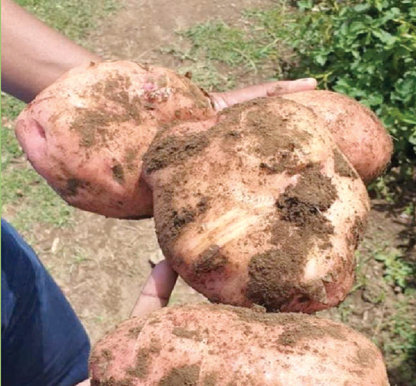Potato is a crop whose importance has, over the years, been largely overlooked in Kenya’s food security discourse. This is despite the crop’s great importance in the country’s fight against food and nutrition insecurity, according to nutritional and food security experts in the industry.
The National Potato Council of Kenya (NCPK), which is the country’s potato value- chain stakeholders umbrella body, indicates that potato is the second staple crop in Kenya after maize, a factor that has largely remained ignored by many across the country.

| Selecting the best from a potato harvest: The potential in the growth of potatoes is expanding by the day. |
This food crop plays a key role in the supply of our requisite food energy needs. It is a fat- free source of carbohydrates, vitamins C and B6, numerous micronutrients, and also fibre. This is the more the reason its consumption is encouraged.
It would, therefore, mean that the crop is accorded an equally important role to play in addressing Kenya’s food insecurity, and also promoting diversification of the country’s diet. Across the country, however, many still hold divergent views, perhaps due to the traditional notion largely supporting maize, cereals, and similar crops’ cultivation. But this notion is about to change given the innovative technologies coming up in the potato value chain.
As it happens, data from the NCPK shows that at the very least, 800,000 farmers in Kenya grow potatoes. This earns them roughly Sh46 billion annually, which benefits up to 2.5 million people.
While the crop, by all means, is a key contributor to a nutrition and food-secure Kenya, poverty eradication, and economic development in the country, it still continues to face numerous challenges in its quest to actualise its full potential.
Shortage of quality seeds, inappropriate farming practices, sub-standard planting materials, a disconnect among the players along the crop’s value chain, marketing problems, and pest and disease issues continue to be the biggest obstacles to its full potential.
Rain-fed conditions
According to NCPK Chief Executive Officer, Wachira Kaguongo, other than these challenges, the bulk of the country’s potato production is done under rain-fed conditions which increases its vulnerability to the prevailing erratic weather conditions. “Kenya has the potential to profitably produce potatoes in both great quantities and quality. But prevailing challenges mean we get very low yields,” Mr Kanguogo notes, explaining that the country generally produces yields of about 10 tonnes of potato harvest per hectare, compared to other countries like Egypt .

